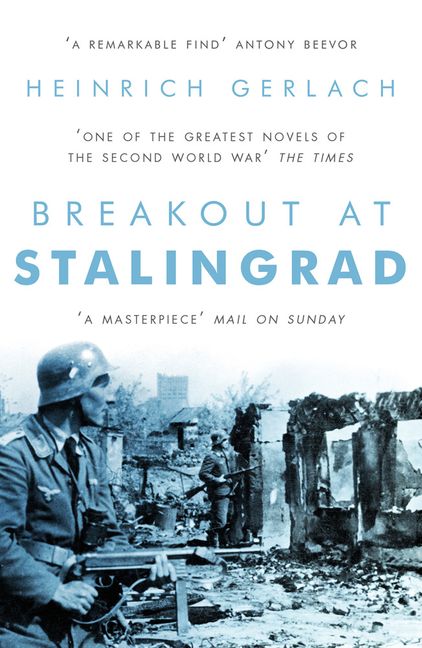
Author: Heinrich Gerlach
Book review by: James Durney, Newbridge Library
After reading the epic novel Stalingrad by Vasily Grossman I decided to follow up my appraisal of this momentous WWII battle with a view from the German side with Breakout at Stalingrad by Heinrich Gerlach. The main character in the book is Lieutenant Breuer who like most of the German soldiers trapped in the city believe they will be relieved by the Wehrmacht and be home on leave for Christmas. However, left to their fate by the over-stretched German Army Breuer and his comrades spend the winter in a frozen hell as snow, ice and relentless Red Army assaults reduce the once-mighty Sixth Army to a diseased and starving rabble. Breakout at Stalingrad is a stark and terrifying portrait of the horrors of war, and a profoundly humane depiction of comradeship in adversity.
The novel, one of the best I have ever read, is an authentic account of what German soldiers went through, from gnawing hunger to being ordered to defend their positions ‘to the last man’ by a madman safe in Berlin. The description of the horrors of Stalingrad are quiet moving and it is hard not to feel sorry for the Germans and their unfortunate allies like the Romanians and Croatians. During the blockade of Stalingrad, many of the German soldiers died of wounds, starvation, and lack of medical care. In the months following their capture, weakened by disease (particularly typhus), malnutrition, and mistreatment, more POWs died. Only about 6,000 Stalingrad survivors lived to be repatriated after the war. Henrich Gerlach was not released until April 1950, despite being a prominent member of the anti-Nazi Association of German Officers.
The book does not end after 550 pages and few novels contain such an extraordinary story behind their publication as this one. The following 150 pages reveal what happened to Gerlach after Stalingrad. In captivity, Gerlach began to write diary entries about his experiences and then began working on a novel. His manuscript was confiscated by the KGB in 1949 and labelled anti-Soviet. Gerlach later became a Latin and German teacher and his semi-autobiographical novel, The Forsaken Army – it was rewritten with the help of hypnosis – was published in West Germany in 1957. In 2012, Carsten Gansel discovered the original manuscript in the State Russian Military Archive. It was then published in
Germany in 2016 and its English translation was published the following year as Breakout at Stalingrad. This highly recommended book is available to borrow from many libraries countrywide.





Leave a Reply